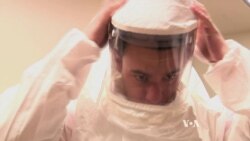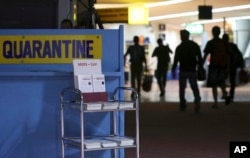A lethal new virus that originated in the Middle East is spreading and there is no drug to fight it.
Or is there? Scientists are scouring the medicine cabinet for existing drugs to fight Middle East Respiratory Syndrome (MERS) and they're finding some unexpected candidates.
In lab studies, drugs against cancer, neurological disorders and other ailments show promise to help treat MERS.
Why would a cancer drug stop a virus? Scientists don’t necessarily know. But the fact that they work at all is helping researchers understand previously unknown ways in which the drugs -- and the viruses -- function.
'Extraordinary' virus
MERS has killed about a quarter of the roughly 500 people infected since it was first detected in 2012.
“The mortality rate is extraordinary,” said National Institute of Allergy and Infectious Diseases Director Anthony Fauci. “That’s unheard of with common respiratory infections. That’s the very, very sobering news about this. The somewhat encouraging news so far is that it is not readily spread from person to person.” The virus that causes MERS is related to the SARS virus that erupted out of China in 2003. SARS killed about 10 percent of its approximately 8,000 victims but it was much more contagious than MERS is. Experts are keeping a close eye on MERS in case it mutates to become more infectious.
Long wait for new drugs
Doctors have little to offer MERS patients. There are no drugs approved by the U.S. Food and Drug Administration.
And developing a new drug is time-consuming and expensive. Virologist Matt Frieman at the University of Maryland at Baltimore says candidates that work well in a test tube often do not work in living cells.
“And the ones that do, when you now take them from a cell to an animal model of the disease, most of them don’t work,” he said.
Drugs that are effective in animal tests still need to go through three stages of clinical trials to be sure they help sick people without doing more harm than good.
“Starting from scratch, to go from basic research in an academic lab to getting a product licensed by the FDA, can take a decade and tons and tons of money,” said immunologist Erik Stemmy, who oversees MERS research grants for the National Institute of Allergy and Infectious Diseases (NIAID).
Robot testing
That’s why NIAID is backing efforts to look for drugs that are already FDA-approved for something else that might also work against MERS.
Robots are lending a hand. Automated systems developed in just the last few years can screen hundreds of drugs at a time.
“You can do a lot of quick, test-tube, petri-dish screens to see if, hey, does this have any efficacy or not,” Stemmy said. “That’s what’s really moving this field forward.”
Stemmy added that researchers are using the same techniques to hunt for existing drugs that fight antibiotic-resistant germs, another growing public health problem with little or nothing new in the drug-development pipeline.
The robots have turned up about two dozen drugs that Frieman is putting through further tests.
“Most of them have not been used against viruses at all,” he said.
It is not always clear how these drugs work, even for their intended purpose. Frieman says only recently did scientists begin designing medicines against specific parts of a cell’s machinery. Many started out as plant extracts or other compounds that treated a disease, even though doctors did not know why or how.
“A lot of these drugs do things that either were not known before,” he said, “or they target the things that everyone thought they targeted, but no one knew that that was involved in virus replication.”
When a virus infects a cell, it hijacks the cell’s machinery to replicate, or make copies of itself. In pictures from one experiment, Frieman points out how one type of cellular protein important in infection is normally scattered around the cell, but moves to the center of the cell when treated with one drug.
“We don’t know why they do this with the drug. But we know that the drug that does this inhibits replication of the virus.”
'Promising candidates'
These drugs still need to be tested to see if they work as well in animals as they do in a petri dish. Only then would they be considered for sick patients.
But the fact that they are already FDA-approved is one less hurdle they need to clear.
“I think that we have some definite promising therapeutic candidates in the pipeline,” Stemmy said. “And I think that if things progress with the infections and the spread, I think we’re in a really good position to be able to respond.”
And what they are learning from MERS may put scientists in a good position to respond to other new viruses.
Or is there? Scientists are scouring the medicine cabinet for existing drugs to fight Middle East Respiratory Syndrome (MERS) and they're finding some unexpected candidates.
In lab studies, drugs against cancer, neurological disorders and other ailments show promise to help treat MERS.
Why would a cancer drug stop a virus? Scientists don’t necessarily know. But the fact that they work at all is helping researchers understand previously unknown ways in which the drugs -- and the viruses -- function.
'Extraordinary' virus
MERS has killed about a quarter of the roughly 500 people infected since it was first detected in 2012.
“The mortality rate is extraordinary,” said National Institute of Allergy and Infectious Diseases Director Anthony Fauci. “That’s unheard of with common respiratory infections. That’s the very, very sobering news about this. The somewhat encouraging news so far is that it is not readily spread from person to person.” The virus that causes MERS is related to the SARS virus that erupted out of China in 2003. SARS killed about 10 percent of its approximately 8,000 victims but it was much more contagious than MERS is. Experts are keeping a close eye on MERS in case it mutates to become more infectious.
Long wait for new drugs
Doctors have little to offer MERS patients. There are no drugs approved by the U.S. Food and Drug Administration.
And developing a new drug is time-consuming and expensive. Virologist Matt Frieman at the University of Maryland at Baltimore says candidates that work well in a test tube often do not work in living cells.
“And the ones that do, when you now take them from a cell to an animal model of the disease, most of them don’t work,” he said.
Drugs that are effective in animal tests still need to go through three stages of clinical trials to be sure they help sick people without doing more harm than good.
“Starting from scratch, to go from basic research in an academic lab to getting a product licensed by the FDA, can take a decade and tons and tons of money,” said immunologist Erik Stemmy, who oversees MERS research grants for the National Institute of Allergy and Infectious Diseases (NIAID).
Robot testing
That’s why NIAID is backing efforts to look for drugs that are already FDA-approved for something else that might also work against MERS.
Robots are lending a hand. Automated systems developed in just the last few years can screen hundreds of drugs at a time.
“You can do a lot of quick, test-tube, petri-dish screens to see if, hey, does this have any efficacy or not,” Stemmy said. “That’s what’s really moving this field forward.”
Stemmy added that researchers are using the same techniques to hunt for existing drugs that fight antibiotic-resistant germs, another growing public health problem with little or nothing new in the drug-development pipeline.
The robots have turned up about two dozen drugs that Frieman is putting through further tests.
“Most of them have not been used against viruses at all,” he said.
It is not always clear how these drugs work, even for their intended purpose. Frieman says only recently did scientists begin designing medicines against specific parts of a cell’s machinery. Many started out as plant extracts or other compounds that treated a disease, even though doctors did not know why or how.
“A lot of these drugs do things that either were not known before,” he said, “or they target the things that everyone thought they targeted, but no one knew that that was involved in virus replication.”
When a virus infects a cell, it hijacks the cell’s machinery to replicate, or make copies of itself. In pictures from one experiment, Frieman points out how one type of cellular protein important in infection is normally scattered around the cell, but moves to the center of the cell when treated with one drug.
“We don’t know why they do this with the drug. But we know that the drug that does this inhibits replication of the virus.”
'Promising candidates'
These drugs still need to be tested to see if they work as well in animals as they do in a petri dish. Only then would they be considered for sick patients.
But the fact that they are already FDA-approved is one less hurdle they need to clear.
“I think that we have some definite promising therapeutic candidates in the pipeline,” Stemmy said. “And I think that if things progress with the infections and the spread, I think we’re in a really good position to be able to respond.”
And what they are learning from MERS may put scientists in a good position to respond to other new viruses.







